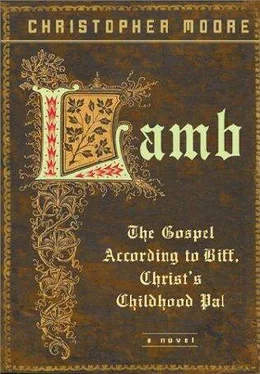“What are you saying? What? What?”
“And who is your friend, Maggie?” A man’s voice, coming from near the forge. I looked over and suddenly realized what Maggie had been trying to tell me.
“Uncle Jeremiah, this is Levi bar Alphaeus. We call him Biff. He has to go now.”
I started backing away from the killer. “Yes, I have to go.” I looked at Maggie, not knowing what to do. “I’ll—we—I have to—”
“We’ll see you in Sepphoris,” Maggie said.
“Right,” I said, then I turned and dashed away, feeling more like a coward than I ever have in my life.
When we got back to Sepphoris there was a large gathering of Jews, perhaps two hundred, outside of the city walls, most I recognized as being from Nazareth. No mob mentality here, more a fearful gathering. More than half of those gathered were women and children. In the middle of the crowd, a contingent of a dozen Roman soldiers pushed back the onlookers while two slaves dug a grave. Like my own people, the Romans did not dally with their dead. Unless there was a battle ongoing, Roman soldiers were often put in the ground before the corpse was cool.
Joshua and I spotted Maggie standing between her father and her murderous uncle at the edge of the crowd. Joshua took off toward her. I followed, but before I got close, Joshua had taken Maggie’s hand and dragged her into the midst of the crowd. I could see Jeremiah trying to follow them. I dove into the mass and crawled under people’s feet until I came upon a pair of hobnail boots which indicated the lower end of a Roman soldier. The other end, equally Roman, was scowling at me. I stood up.
“Semper fido,” I said in my best Latin, followed by my most charming smile.
The soldier scowled further. Suddenly there was a smell of flowers in my nose and sweet, warm lips brushed my ear. “I think you just said ‘always dog,’” Maggie whispered.
“That would be why he’s looking so unpleasant then?” I said out the side of my charming smile.
In my other ear another familiar, if not so sweet whisper, “Sing, Biff. Remember the plan,” Joshua said.
“Right.” And so I let loose with one of my famous dirges. “La-la-la. Hey Roman guy, too bad about your getting stabbed. La-la-la. It’s probably not a message from God or nothing. La-la-la. Telling you that maybe you should have gone home, la, la, la. Instead of oppressing the chosen people who God hisownself has said that he likes better than you. Fa, la, la, la.”
The soldier didn’t speak Aramaic, so the lyrics didn’t move him as I had hoped. But I think the hypnotic toe-tappiness of the melody was starting to get him. I plunged into my second verse.
“La-la-la, didn’t we tell you that you shouldn’t eat pork, la-la. Although looking at wounds in your chest, a dietary change might not have made that big a difference. Boom shaka-laka-laka-laka, boom shaka-laka-lak. Come on, you know the words!”
“Enough!”
The soldier was yanked aside and Gaius Justus Gallicus stood before us, flanked by two of his officers. Behind him, stretched out on the ground, was the body of the dead soldier.
“Well done, Biff,” Joshua whispered.
“We’re offering our services as professional mourners,” I said with a grin, which the centurion was eager not to return.
“That soldier doesn’t need mourners, he has avengers.”
A voice from the crowd. “See here, Centurion, release Joseph of Nazareth. He is no murderer.”
Justus turned and the crowd parted, leaving a path between him and the man who had spoken up. It was Iban the Pharisee, standing with several other Pharisees from Nazareth.
“Would you take his place?” Justus asked.
The Pharisee backed away, his resolve melting quickly under the threat.
“Well?” Justus stepped forward and the crowd parted around him. “You speak for your people, Pharisee. Tell them to give me a killer. Or would you rather I crucify Jews until I get the right one?”
Iban was flustered now, and began jabbering a mishmash of verses from the Torah. I looked around and saw Maggie’s uncle Jeremiah standing only a few paces behind me. When I caught his eye he slipped his hand under his shirt—to the haft of a knife, I had no doubt.
“Joseph didn’t kill that soldier!” Joshua shouted.
Justus turned to him and the Pharisees took the opportunity to scramble to the back of the crowd. “I know that,” Justus said.
“You do?”
“Of course, boy. No carpenter killed that soldier.”
“How do you know that?” I asked.
Justus motioned to one of his legionnaires and the soldier came forward carrying a small basket. The centurion nodded and the soldier upended the basket. The stone effigy of Apollo’s severed penis thudded to the ground in front of us.
“Uh-oh,” I said.
“Because it was a stonecutter,” Justus said.
“My, that is impressive,” Maggie said.
I noticed that Joshua was edging toward the body of the soldier. I needed to distract Justus. “Aha,” I said, “someone beat the soldier to death with a stone willie. Obviously the work of a Greek or a Samaritan—no Jew would touch such a thing.”
“They wouldn’t?” Maggie asked.
“Jeez, Maggie.”
“I think you have something to tell me, boy,” Justus said.
Joshua had laid hands on the dead soldier.
I could feel everyone’s eyes on me. I wondered where Jeremiah was now. Was he behind me, ready to silence me with a knife, or had he made his escape? Either way, I couldn’t say a word. The Sicarii did not work alone. If I gave up Jeremiah I’d be dead by a Sicarii dagger before the Sabbath.
“He can’t tell you, Centurion, even if he knew,” said Joshua, who had moved back to Maggie’s side. “For it is written in our holy books that no Jew shall rat out another Jew, regardless of what a weasel one or the other shall be.”
“Is that written?” Maggie whispered.
“Is now,” Joshua whispered back.
“Did you just call me a weasel?” I asked.
“Behold!” A woman at the front of the crowd was pointing to the dead soldier. Another screamed. The corpse was moving.
Justus turned toward the commotion and I took the opportunity to look around for Jeremiah. He was still there behind me, only a few people back, but he was staring gape-jawed at the dead soldier, who was currently standing up and dusting off his tunic.
Joshua was concentrating intently on the soldier, but there was none of the sweating or trembling that we had seen at the funeral in Japhia.
To his credit, Justus, although he seemed frightened at first, stood his ground as the corpse ambled stiff-legged toward him. The other soldiers were backing away, along with all of the Jews except Maggie, Joshua, and me.
“I need to report an attack, sir,” the once-dead soldier said, performing a very jerky Roman salute.
“You’re—you’re dead,” Justus said.
“Am not.”
“You have knife wounds all over your chest.”
The soldier looked down, touched the wounds gingerly, then looked back to his commander. “Seems I have been nicked, sir.”
“Nicked? Nicked? You’ve been stabbed half a dozen times. You’re dead as dirt.”
“I don’t think so, sir. Look, I’m not even bleeding.”
“That’s because you’ve bled out, son. You’re dead.”
The soldier began to stagger now, started to fall, and caught himself. “I am feeling a little woozy. I was attacked last night sir, near where they are building that Greek’s house. There, he was there.” He pointed to me.
“And him too.” He pointed to Joshua.
“And the little girl.”
“These boys attacked you?”
I could hear scuffling behind me.
“No, not them, that man over there.” The soldier pointed to Jeremiah, who looked around like a trapped animal. Everyone was so intent on watching the miracle of the talking corpse that they had frozen in place. The killer couldn’t push his way through the crowd to get away.
Читать дальше










